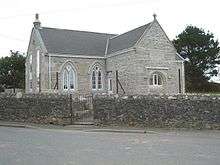Wendron
| Wendron | |
| Cornish: Gwendron | |
| Wendron Parish Church |
|
 Wendron |
|
| Population | 2,656 (2011 census) |
|---|---|
| OS grid reference | SX411591 |
| Civil parish | Wendron |
| Unitary authority | Cornwall |
| Ceremonial county | Cornwall |
| Region | South West |
| Country | England |
| Sovereign state | United Kingdom |
| Post town | HELSTON |
| Postcode district | TR13 |
| Dialling code | 01326 |
| Police | Devon and Cornwall |
| Fire | Cornwall |
| Ambulance | South Western |
| EU Parliament | South West England |
| UK Parliament | Camborne and Redruth |
Coordinates: 50°08′02″N 5°14′53″W / 50.134°N 5.248°W
Wendron (Cornish: Gwendron)[1][2] is a village and civil parish in Cornwall, England, United Kingdom. It is 3 miles (5 km) north of Helston. The parish population at the 2011 census was 2,656. The electoral ward of Wendron had a 2011 population of 4,936.[3]
Church history
Until the mid 19th century the parish of Wendron included also the town of Helston and the area which became the parishes of Carnmenellis and Pencoys. The parish of Carnmenellis was created in 1846; Helston in 1848; and Pencoys in 1881.[4]
Before 1284 Edmund, Earl of Cornwall, gave the church of Wendron, with its chapels, to Rewley Abbey near Oxford. Before this it had belonged to the earl's manor of Helston which included the whole parish. The church is cruciform but was enlarged in the 15th century and is of great interest.[4]
The holy well of St Wendrona is at Trelill and nearby was her chapel, licensed in 1427, about the same date as the well. At Merther Uny was a quasi-parochial chapel of St Uny with its own cemetery. At Degibma, on Loe Pool, was a chapel of St Degamanus. At Bodilly was a chapel of St Henry the Hermit (died 1120, feast day on 16 January).[5]
The Revd G. H. Doble served for almost twenty years as the vicar of Wendron (1925–1945). Langdon (1896) recorded the existence of eight stone crosses in the parish, including two at Merther Uny. The church of St Wendrona contains the brass of Warin Penhalluryk, rector of St Just, vicar of Wendron and Stithians, d. 1535.[6]
- Nonconformity
There were Wesleyan Methodist chapels at Edgecumbe, Menhay, Penmarth, Porkellis, Burrows, Coverack Bridges, Degibna, Gweek and Crelly. There were Bible Christian chapels at Boskenwyn Downs and Carnkie; Wesleyan Methodist Free chapels at Trewenack and Four Lanes; and a Baptist chapel in Lower Town, now part of Helston.[7]
History and heritage

The historic parish of Wendron was in the Hundred of Kerrier; it was originally bounded by the parishes of Illogan, Gwennap, Stithians, Constantine, Mawgan-in-Meneage, Gunwalloe, Sithney and Crowan. The villages of Wendron Churchtown, Coverack Bridges, Lower Town, Trewennack, Gweek, Edgecumb, Menhay and Four Lanes were in the historic parish. In the 19th century this was an important tin-mining area and severe unemployment was caused when mining declined. In 1878 the landowner, Lord Robartes, tried to help the unemployed by bringing uncultivated land into production.[7]
The Cornwall and West Devon Mining Landscape World Heritage Site is partly in Wendron parish. The Long Stone on Prospidnick Hill is just to the east.
References
- ↑ "Place names in the SWF". MAGA. Cornish Language Partnership. Retrieved 26 March 2015.
- ↑ List of Place-names agreed by the MAGA Signage Panel (PDF), Cornish Language Partnership, 4 March 2015, retrieved 26 March 2015
- ↑ "Wendron". UK Census Data. UKCensusdata.com. Retrieved 15 February 2015.
- 1 2 Henderson, Charles (1925). The Cornish Church Guide. Truro: Blackford. p. 217.
- ↑ Henderson (1925), pp. 10 and 217-18.
- ↑ Dunkin, E. (1882). Monumental Brasses. London: Spottiswoode.
- 1 2 Argall, Ian (25 March 2013). "Wendron". GENUKI, United Kingdom & Ireland Genealogy. GENUKI.
External links
![]() Media related to Wendron at Wikimedia Commons
Media related to Wendron at Wikimedia Commons
- "Online Catalogue for Wendron". Cornwall Record Office.